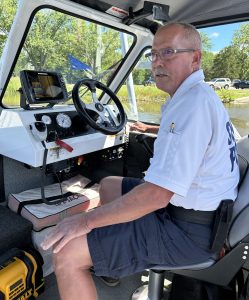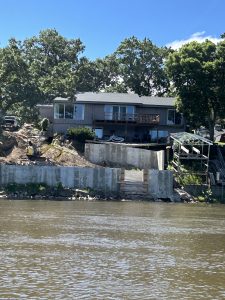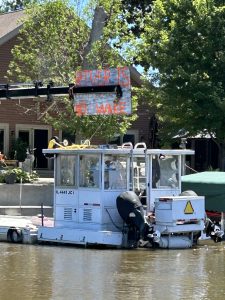Safety on the water key to recreational fun
By Lynne Conner For Chronicle Media — July 17, 2024
Steve Kempin, senior deputy of the Winnebago County Sheriff’s Department, operates the department’s patrol boat. (Photo by Lynne Conner / For Chronicle Media)
The freedom, exhilaration and sheer joy of summertime water sports is an unparalleled experience.
However, the excitement of jet skiing, boating, fishing or even kayaking throughout the state can quickly become an emergency, if proper safety measures aren’t followed.
“We’re out on area rivers in the county to educate the public on boating safety and help everyone enjoy their experience on the water,” said Steve Kempin, senior deputy of the Winnebago County Sheriff’s Department.
Like Kempin, his counterparts around the state also have safety as a top priority whether on Lake Michigan, the Rock, Illinois or Mississippi rivers or smaller lakes and waterways found throughout the Prairie State.
“Operating a boat is much like driving a car, but there are obvious differences and considerations to know,” Kempin said. “Taking a boating safety course isn’t required before going out on the water, but it’s a very good idea. Free boating safety courses are available and can be found on the Winnebago County Sheriff’s Department website.”
Such safety courses cover the rules of the water, required safety equipment and other pertinent boating protocols.
The state of Illinois requires anyone born after Jan. 1, 1998 and operating a motorized vessel of more than 10 horsepower to pass a boater safety course and carry a boater education card. For information, visit www.boat-ed.com/illinois/
In recent weeks, the Rock River and the Chain O’ Lakes areas in McHenry and Lake counties have been under no-wake orders, meaning that boats must travel at the lowest possible speed to maintain steering but not create waves in their wake.
“Due to all the rain and flooding we’ve had, the river level is very high, and that’s why it’s currently a no-wake zone, Kempin said. “The Fordham Dam in downtown Rockford feeds water level information to a satellite so the Sheriff’s Department can determine whether or not to institute a no-wake zone.”
In June, a safety cable across the dam broke due to high water levels and fast-moving debris traveling down the Rock River. The no-wake order is to protect boaters and homeowners along the waterway.
“The Rock River and other rivers in the area are natural waterways, which means they’re not

Years of wear and tear from the currents of the Rock River have caused some waterfront homeowners to need dock repairs. (Photo by Lynne Conner / For Chronicle Media)
maintained,” Kempin said. “Flooding and boats traveling too fast will dislodge debris, which will float in the river. You can be cruising along and not see these hazards until you’re right on them. That’s when damage to boats and accidents happen.”
Homeowners along a river can also incur damage if boaters don’t follow the no-wake order.
“If a boat creates a wake, that water is going to wash up onto the yard of the property, the seawall is going to get drenched with dirt and debris, moving the wall forward and eventually washing out the seawall and causing damage to the property,” Kempin said.
Safety violations, including not following the no-wake order, reckless boating, and disobeying the rules of the water, can get boaters pulled over by law enforcement patrols.
“Some individuals got educated the other day because they were creating a wake and didn’t have proper safety equipment on their boat,” Kempin said. “Boat operators must have an ignition kill switch attached to their person. This allows them to deactivate the boat’s motor if they fall overboard, causing the boat to stop rather than continuing unmanned.”
Other required onboard safety equipment include at least one life jacket, a fire extinguisher, a horn, an anchor and navigational lights.
While jet skis can be an exciting way to cruise a lake or river, Kempin warns that misusing a jet ski could have critical consequences.

A waterfront homeowner posted a homemade reminder of the Rock River’s no-wake zone status. (Photo by Lynne Conner / For Chronicle Media)
“Jet skis are required to be off the water 30 minutes before sunset because they have no navigational lights. At night, a jet ski is an unidentified missile to boats because boaters can’t see a jet ski until they’re right on top of them, which most often results in an accident.”
Kempin’s best advice for an enjoyable time on the water is to “follow safe boating guidelines, have the appropriate safety equipment and be conscious of other boaters around you. Treat them like you’d want to be treated, and don’t be reckless.”
More information on responsible boating in Illinois, including a downloadable free handbook, is available at /www.boat-ed.com/illinois/handbook/







